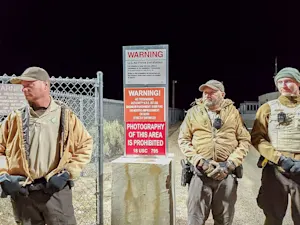
California Confirms First Local Spread of Severe Mpox Strain
Monkeypox, 1971. Photo courtesy of the CDC's Public Health Image Library. Public domain.
Three adults in California have reportedly been hospitalized with a severe strain of Mpox, marking a troubling first for the United States. The cases, confirmed in Los Angeles County and Long Beach, involve Clade I Mpox, a more virulent form of the virus previously confined to central and eastern Africa. Health officials are now investigating possible local spread of this dangerous strain, raising alarms amid ongoing concerns about vaccination rates and underreported infections.
A New Chapter in Mpox's US Story
Until recently, the Mpox cases in the US were linked to Clade II, the less severe strain responsible for the 2022 outbreak that sickened tens of thousands but rarely proved fatal. Clade I, however, has a history of causing more severe illness and higher death rates in parts of Africa, particularly the Democratic Republic of the Congo. The emergence of three unrelated Clade I cases in California, all without recent travel history, signals a new and unsettling development in the virus's trajectory.
The California Department of Public Health confirmed the cases, noting that all three patients were hospitalized but are now recovering, as reported by The Guardian. Two cases were identified in Los Angeles County, while the first was reported in Long Beach earlier that week. Officials have not found a direct link between the Long Beach case and the Los Angeles cases, suggesting multiple points of exposure or transmission within the community.
What Makes Clade I Different?
Clade I Mpox is known for its more aggressive symptoms and higher fatality rates compared to Clade II. The virus typically begins with flu-like symptoms such as fever, chills, and muscle aches, followed by a rash that progresses from raised spots to fluid-filled blisters and eventually scabs. In Africa, Clade I has caused widespread disease and deaths, especially among vulnerable populations.
Dr. Seth Blumberg, an associate professor of medicine at the University of California, San Francisco, cautioned that while the historical data from Africa may not fully translate to the US context, the presence of Clade I requires "careful evaluation," as reported by The Guardian. He emphasized that vaccines can reduce the severity of disease, even if they do not completely prevent infection.
Public Health Response and Vaccination Efforts
California health officials are actively tracing potential exposure sources and urging at-risk populations to complete the two-dose Jynneos vaccine series, as reported by The Guardian. The vaccine, approved by the Food and Drug Administration, protects against both Clade I and II Mpox strains. It requires two doses spaced a month apart, with full immunity developing two weeks after the second dose. However, the Centers for Disease Control and Prevention (CDC) notes that the duration of vaccine protection remains uncertain, and no booster shots are currently recommended.
Dr. Rita Nguyen, assistant state public health officer, highlighted that Clade I Mpox cases can be severe, especially for people with weakened immune systems. She stressed the importance of vaccination for those who may be at risk, including individuals and their sexual partners in affected communities, as reported by The Guardian.
Community Spread and Ongoing Investigations
The Long Beach Department of Health and Human Services confirmed the first local Clade I case after testing at a state lab, as reported by News Tribune. Los Angeles County health officials reported two additional cases shortly after. While no direct connection has been established between the cases, investigators have not identified any close contacts with recent travel abroad, suggesting local transmission may be occurring.
Nora Balanji, communicable disease coordinator for Long Beach, acknowledged that while there is no definitive proof of ongoing community spread, the situation is under close scrutiny, as reported by News Tribune. Some close contacts of the infected individuals have reportedly received vaccinations as a precautionary measure.
Federal Reassurances vs. Local Concerns
Despite the emergence of these severe cases, federal officials maintain that the overall risk to the public remains low. The CDC has reported only six prior US cases of Clade I Mpox, all linked to international travel. The current cases are the first confirmed instances of local spread within the US, as reported by The Guardian.
However, the federal government's response has been complicated by a recent shutdown and staffing shortages at the CDC, which have limited the agency's ability to fully engage in outbreak response. Dr. William Schaffner, an infectious diseases expert at Vanderbilt University, warned that prolonged disruptions could impair public health efforts to contain outbreaks like this one, as reported by News Tribune.
Meanwhile, local infectious disease teams in California hospitals are quietly circulating emergency alerts, preparing for the possibility of more cases. The tension between federal reassurances and local vigilance underscores the uncertainty surrounding this new chapter in Mpox's US presence.
What Comes Next?
California health officials are intensifying efforts to identify additional cases and potential transmission chains. The situation remains fluid, with investigations ongoing and public health messaging emphasizing vaccination and awareness.
Dr. Muntu Davis, Los Angeles County health officer, acknowledged the concerns raised by the third case with no travel history, calling it a signal to continue "working closely with our partners to identify potential sources and understand how this potentially more serious type of the Mpox virus may be spreading," as reported by ABC News.
As the state grapples with this new threat, the balance between caution and calm will be critical. The coming weeks will reveal whether Clade I Mpox establishes a foothold in California or if swift public health action can contain its spread.
For now, the message is clear: stay informed and watch closely as this story unfolds.
References: Three cases of severe mpox reported in California, health officials say | US news | California mpox cases raise concerns, but health officials say risk remains low | California officials investigate possible local spread of mpox after 3 cases with no travel history reported
























